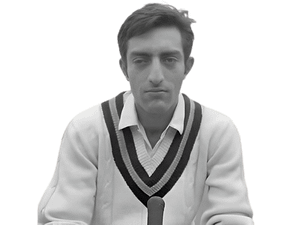Mansoor Ali Khan Pataudi Biography

Mansoor Ali Khan Pataudi, fondly remembered as “Tiger Pataudi,” was more than just a cricketer—he was royalty both on and off the field. Born into a noble family with a cricketing lineage, he rose to become one of India’s youngest and most charismatic cricket captains. His life was an intricate blend of princely heritage, academic brilliance, sporting excellence, and understated glamour. Despite losing vision in one eye, he went on to become one of India’s finest cricket captains. This biography explores his education, illustrious cricket career, net worth, business affiliations, and enduring legacy.
Mansoor Ali Khan Pataudi Early Life and Royal Heritage
- Full Name: Mansoor Ali Khan Pataudi
- Nicknames: Tiger Pataudi, Nawab of Pataudi Jr.
- Date of Birth: January 5, 1941
- Place of Birth: Bhopal, Madhya Pradesh, India
- Father: Iftikhar Ali Khan Pataudi (Nawab of Pataudi, Indian cricketer)
- Mother: Sajida Sultan (Begum of Bhopal)
Mansoor Ali Khan Pataudi was born into two prominent royal families. His father, Iftikhar Ali Khan, was not only the Nawab of Pataudi but also played Test cricket for both England and India. His mother, Sajida Sultan, belonged to the royal family of Bhopal. Inheriting this aristocratic lineage, young Mansoor was raised in a palace environment surrounded by culture, privilege, and discipline.
Mansoor Ali Khan Pataudi Education
Mansoor’s education was a combination of traditional royalty and global exposure.
- Early Schooling: Welham Boys’ School, Dehradun
- Secondary Education: Lockers Park Prep School and then Winchester College, UK
- Higher Education: Balliol College, Oxford University
At Winchester, he was known for his athletic ability and leadership. He was an all-round sportsman, playing cricket, football, and even hockey. At Oxford, he earned a Blue in cricket and showcased his extraordinary talent, despite a life-changing accident that would have ended many careers.
Tragic Accident – Loss of an Eye
In 1961, at the age of 20, Mansoor suffered a tragic car accident in England. A shard of glass from the shattered windscreen permanently damaged his right eye, leaving him with only partial vision.
Many thought his cricketing journey was over. But defying all odds and with remarkable resilience, Mansoor returned to the field. Adapting to his new condition, he trained harder, developed new techniques, and played international cricket with just one functional eye—a feat unparalleled in the cricketing world.
Mansoor Ali Khan Pataudi Cricket Career
Domestic and Early Cricket
Even before his accident, Pataudi had shown promise in school and college-level cricket. At Oxford, he scored over 1,000 runs in his first season, becoming one of the top young talents in English cricket.
India Debut
- Test Debut: December 13, 1961, vs England at Delhi
- Last Test Match: June 23, 1975, vs West Indies
Captaincy at 21
In 1962, following the injury of Nari Contractor, Pataudi was appointed as the captain of the Indian Test team—the youngest-ever captain at the age of 21 at the time. He captained India in 40 of his 46 Tests, winning 9 of them.
Key Achievements
- First Captain to Win Overseas Test Series: Under his leadership, India won its first overseas Test series in New Zealand in 1967–68.
- Wins in Subcontinent: He led India to multiple home victories and played a crucial role in transforming India from an underdog to a competitive team.
- Notable Performance: Scored a memorable 203* for Delhi University despite having limited vision.
Stats Overview
- Matches: 46 Test matches
- Runs: 2,793
- Batting Average: 34.91
- 100s/50s: 6/16
- Highest Score: 203*
Despite the handicap, Pataudi played aggressive cricket, encouraged team spirit, and believed in a positive brand of cricket long before it became fashionable.
Leadership Style and Legacy
Pataudi revolutionized Indian cricket’s mindset. He encouraged spin bowling partnerships, backed young talent like Bishan Singh Bedi, Erapalli Prasanna, and Bhagwat Chandrasekhar, and made fielding a priority. His stylish demeanor and royal composure brought a new aura to Indian cricket.
He is widely credited with building the foundation of modern Indian cricket, fostering a fighting spirit, and instilling self-belief in Indian players.
Mansoor Ali Khan Pataudi Personal Life
Marriage and Family
- Spouse: Sharmila Tagore (married in 1969) – a leading Bollywood actress and a cultural icon.
- Children:
- Saif Ali Khan – Bollywood actor
- Saba Ali Khan – Jewellery designer and mutawalli (custodian) of Auqaf-e-Shahi
- Soha Ali Khan – Bollywood actress and author
Their marriage was iconic—uniting Bollywood glamour and royal lineage. The couple remained married until Mansoor’s death in 2011.
Business Interests and Public Life
Though Mansoor Ali Khan Pataudi didn’t engage in traditional business ventures, his involvement in cricket administration, media, and endorsements added to his stature and earnings.
Cricket Administration:
- Served as India’s cricket team manager during tours.
- Member of the Indian Premier League Governing Council.
- Chairman of the Indian National Selection Committee in the late 1990s.
- He also remained connected to the Pataudi Trophy, awarded in England-India Test series.
Endorsements:
He was among the first cricketers to endorse products on TV—paving the way for future generations of sports endorsements.
Mansoor Ali Khan Pataudi Net Worth and Assets
Being born into the princely Pataudi and Bhopal families, Mansoor inherited significant properties and wealth.
Approximate Net Worth (At Time of Death in 2011):
- Estimated: ₹400–500 crore (USD $60–75 million approx)
Assets Included:
- Pataudi Palace (Ibrahim Kothi): A lavish palace near Gurgaon, Haryana, built by his grandfather. Estimated worth: ₹800 crore today.
- Land Holdings: Farmlands, ancestral properties across Madhya Pradesh and Bhopal.
- Inherited Wealth: Heir to titles and estates from both Pataudi and Bhopal royal lines.
Today, the Pataudi Palace is managed by the family, with Saif Ali Khan having reclaimed it and restored it.
Social Media Presence
Mansoor Ali Khan Pataudi passed away in 2011, before the rise of mainstream social media platforms like Instagram and Twitter in India. As such, he had no personal social media handles.
However, his legacy lives on through:
- Fan pages on Facebook, Instagram
- Documentaries and video tributes on YouTube
- Mentions by his children, especially Saif Ali Khan and Soha Ali Khan on their social media
Honours and Tributes
- Arjuna Award (1964): For excellence in cricket
- Padma Shri (1967): India’s fourth-highest civilian award
- Pataudi Trophy: Instituted by ECB (England and Wales Cricket Board) for Test series between India and England in England, in his memory.
Death and Aftermath
- Date of Death: September 22, 2011
- Cause: Respiratory failure due to interstitial lung disease
- Place: Sir Ganga Ram Hospital, New Delhi
- Age: 70
His death was mourned across the country, with tributes pouring in from cricketers, actors, politicians, and fans. The BCCI observed a minute of silence, and flags flew at half-mast at cricket stadiums.
Legacy
Mansoor Ali Khan Pataudi remains one of the most revered names in Indian cricket. He is celebrated not only for his contributions to the game but also for his unparalleled grace, courage, and leadership. His journey inspired generations of cricketers to dream beyond limitations.
His children have carried forward his legacy in arts, cinema, and public life. His palace has become symbolic of royal India, and his name is eternally linked with India’s transformation into a cricketing powerhouse.
Conclusion
Mansoor Ali Khan Pataudi’s life is a saga of resilience, transformation, and aristocratic charisma. From losing an eye to leading India to overseas Test victories, from the grandeur of princely estates to the grit of the cricket field—his journey is etched in golden letters in India’s sporting and cultural history.
Though he left us in 2011, his impact on Indian cricket and society continues to live through his contributions, his family, and the very spirit of Indian sport.




6 thoughts on “Mansoor Ali Khan Pataudi – The Nawab of Indian Cricket.”